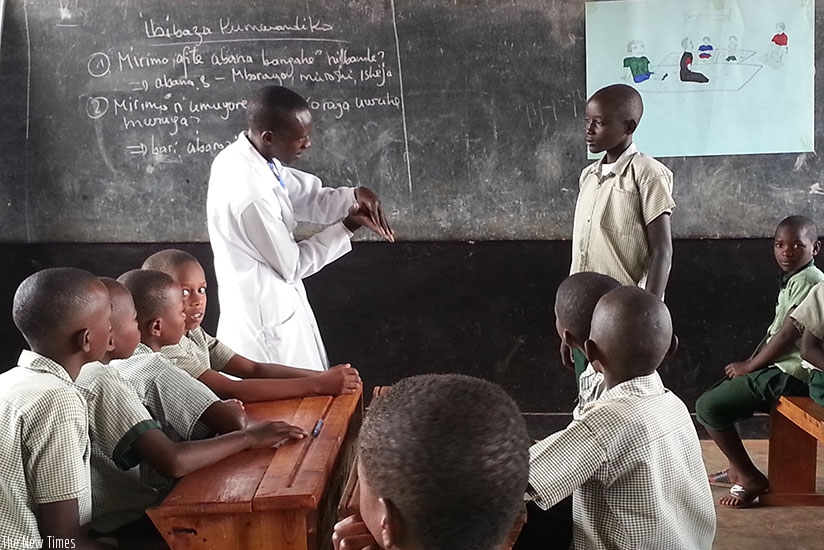Pacifique Mbabazi, a senior 4 secondary school student has a hearing impairment he acquired aged nine months. Sharing his testimony through a sign language interpreter , he says he is passionate about studies but due to his disability, for many years he found it hard to learn in inclusive classes as not even teachers knew how to support him.


Pacifique Mbabazi, a senior 4 secondary school student has a hearing impairment he acquired aged nine months. Sharing his testimony through a sign language interpreter , he says he is passionate about studies but due to his disability, for many years he found it hard to learn in inclusive classes as not even teachers knew how to support him.
"I dropped out of school when in P2 and I remained hopeless until my mother heard about Groupe Scolaire Gishari. After joining the school things became a lot easier as I not only found supportive teachers, but also classmates, thanks to sign language,” he says.
In a bid to support children with the same disability as Mbabazi’s, students of Groupe Scolaire Gishari in Rwamagana District are engaging in various activities to learn sign language to support their classmates with hearing impairment.
Supported by the Handicap International, the school has innovative solutions to support children with disabilities, especially the ones with hearing impairment to learn how to read and write.
At the entrance of the school, the first thing to notice are walls painted with sign language symbols. This is aimed at alerting students as well the staff to get familiar with sign language so that they can easily interact with the students with hearing impairment.
Emmanuel Nzabandora, the director of GS Gishari, says children with disabilities have difficulty adapting to inclusive classes when they don’t have peer support to complement teachers’ efforts.
"To make sure, we attend to their special needs, with the support from Handicap International, the school put in place a resource room that helps a lot during the integration of these students.
"When a student arrives at the school we have a team that starts analyzing the individual type of disability the student has and plan together how they will help them cope in class. In the classroom we make sure the teachers use both signs and speech to make sure everyone is included but students sit in a supportive manner that the ones who are strong in sign language sit with those with a hearing impairment,” he says.
The school also has the resource room equipped with a flat screen where DVDs, books, banners, paintings with sign language on walls for everyone in the school to learn how to use sign language.
Also, parents of students with disabilities gather in that room twice a month to make teaching aids to support their children.
Kellya Ishimwe , a Primary Four student, says she finds learning sign language very interesting because before it was very hard to interact with their classmates with hearing impairment and she always felt bad not being able to help them whenever they needed support.
"Sign language is very easy to learn, and now we are no longer isolated because the barrier of language is doesn’t exist anymore. In the past we feared each other but now we are good friends not only in class but also in our community because we interact freely,” she says.
First-hand experience
Visiting one of the classes, I found Robert Rugamba teaching Kinyarwanda. Students were reading from a story book and answering questions. Students with hearing impairment are also responding using signs.
Rugamba says though teaching in an inclusive setting is challenging, teachers are required to be more creative than in other schools to be able to cope with disability learning needs.
"To respond to children with a hearing impairment, I make sure I cultivate sign language skills and make sure during the lesson I use both speech and signs to get everyone’s attention. I can see that our good approach has made it easy for every pupil. Students with hearing impairment are as competitive in class as those without disability,” he says.
Marie Rose Ntawiha , inclusive education officer with Handicap international, says children with disabilities are less likely to attend schools than those without.
She says even if they attend school, they are more likely to drop out early while the level of schooling they receive is frequently below that of their peers.
To find a solution to this challenge, Ntawiha says Handicap International has brought a new innovative approach to make sure the students with disabilities are enabled to stay in school.
"In close collaboration with the Rwanda Education Board, Handicap International is operating in 18 inclusive schools in 14 districts as pilot. GS Gishari is one of those model inclusive schools where we have established necessary infrastructure adapted to different types of disabilities. Parents with children with disabilities are also grouped in cooperatives to support each other and collaborate with the school in providing needed teaching aids. Teachers also are trained constantly.
"With all this, students with disabilities are offered a better school environment and we hope the same approach can be used in all schools to fully integrate students with disabilities,” she says.


